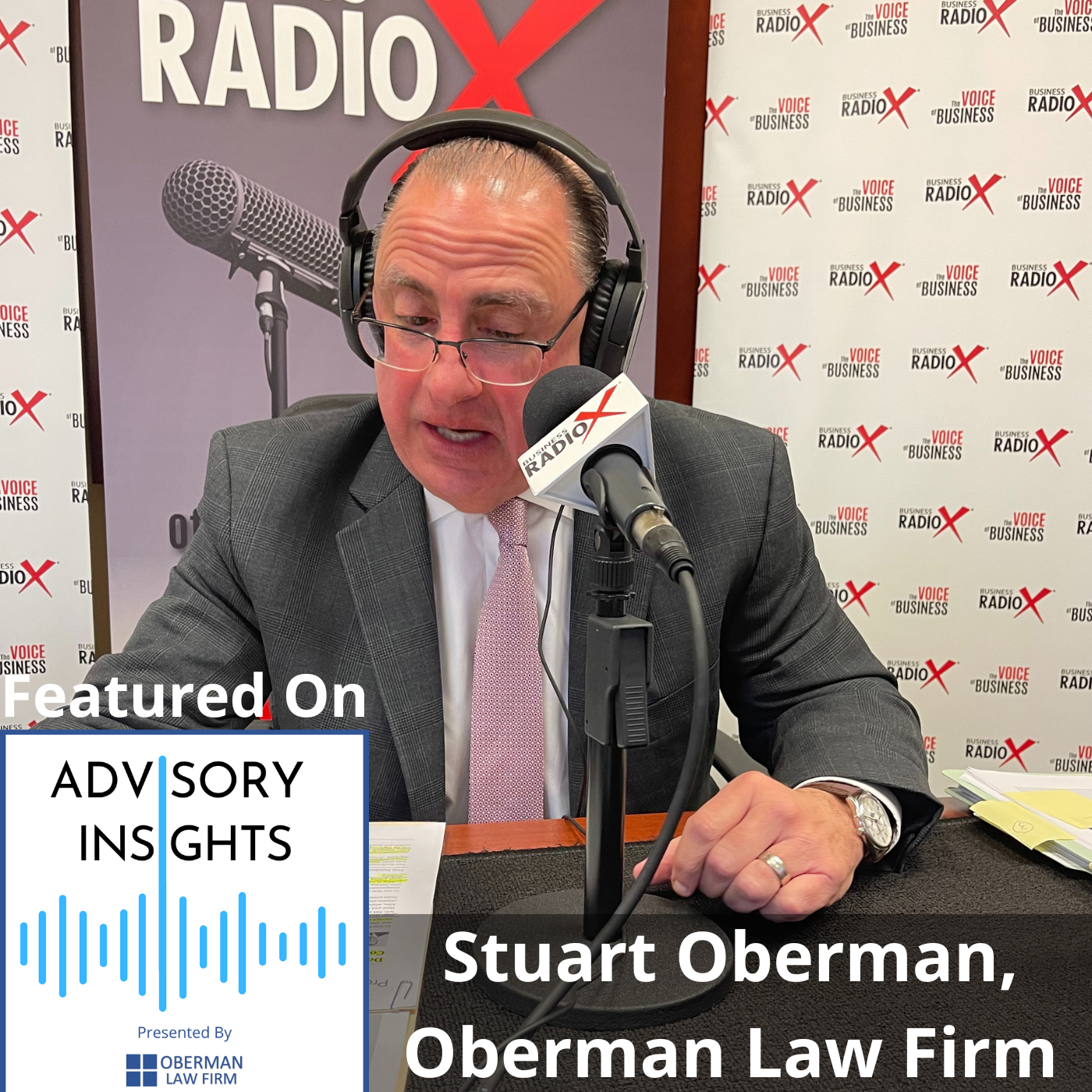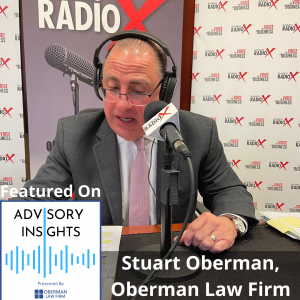
Simple Steps to HR Compliance (Advisory Insights Podcast, Episode 18)
On this episode of Advisory Insights, Stuart Oberman of Oberman Law Firm discusses the importance of compliance with state and federal hiring laws, and simple steps businesses can take to be HR compliant. He advises that interviews and telephone conversations should be recorded, and that organizations should have a process in place to ensure equal pay for equal work.
Advisory Insights is presented by Oberman Law Firm and produced by the North Fulton studio of Business RadioX®. The series can be found on all the major podcast apps. You can find the complete show archive here.
TRANSCRIPT
Intro: [00:00:01] Broadcasting from the studios of Business RadioX, it’s time for Advisory Insights. Brought to you by Oberman Law Firm serving clients nationwide with tailored service and exceptional results. Now, here’s your host.
Stuart Oberman: [00:00:20] Welcome everyone to Advisory Insights. Stuart Oberman here. All right, folks, we’re going to jump right into H.R. We’re going to have a series of H.R. podcasts coming through because it is such a topic going into 2023, and what’s being done in 2022 that lead into 2023. But I want to keep this really simple, because there’s only a handful of things you really need to do in H.R. side in order to stay in compliance and stay out of trouble.
Stuart Oberman: [00:00:52] So, what are we going to do? Topic today, simple steps to H.R. compliance. Simple steps. I’m not talking about reinventing the wheel. I’m talking about looking at things you’re doing internally, what you need to improve, what the map is that you need to follow to the compliance.
Stuart Oberman: [00:01:10] So, let’s take one of the first steps we need to do. First and foremost, folks, your managers have to be trained. A lot of companies, big, small, global do not have managers. They’re not trained. And they’re not really up to date for the challenges that lie ahead.
Stuart Oberman: [00:01:27] You know, look, I don’t care whether you are a startup or Fortune 500 company, H.R. compliance checks are mandatory nowadays. But there’s a couple of things that I want to take a look at. I don’t care whether you have a state, local, or federal issues you’re looking at or you’re a federal contractor or you are doing business with big or small companies, I want you to listen to a couple of regulatory issues from the federal government we want to take a look at that you just have to know.
Stuart Oberman: [00:02:00] One, Fair Labor Standards Act, FLSA. We talked about that on the previous podcast, but now we’re going to look at I want to know what your minimum wage requirements are. Are you paying overtime? Have you reviewed your Affordable Care Act? Now, all that’s going to be jumping into recruiting and hiring as we jump into our next section. American with Disabilities Act, do you even have a guideline for that? A little bit overlap from our last one, but still, I want to follow this trend. OSHA, you know, OSHA violations are very, very stiff. They come with a lot of fines, especially if you are in the healthcare area.
Stuart Oberman: [00:02:39] The Family Medical Leave Act, so what we’re seeing now is are there policies? You know, when couples are having babies, now they’re taking 12 longer weeks off. Are you prepared for that? EEOC, so we’re going to do a statistics with EEOC in, probably, next podcast or two that you’re not going to believe the statistics on those. So, that is why you have to be aware of what’s coming local, what’s coming national, and what’s coming into your area as far as what you’re doing, what you’re located at.
Stuart Oberman: [00:03:14] Recruiting and hiring, I’ll be honest, most of these issues that we’re going to talk about are an absolute disaster when it comes to company organizations. They’re not prepared. They don’t know. They just simply hire anyone who walks across the street and somebody in today’s world. We’re seeing a little bit of a pullback. But, still, you know, they’re hiring bodies and their H.R. compliance is a mess as far as recruiting goes.
Stuart Oberman: [00:03:37] So, as we move quickly into 2023 – again, I don’t care whether you’re a startup or Fortune 500 companies – we have some very, very, very big companies that I will assure you are substantial revenue companies, billion-dollar companies, half-a-billion companies, they are not where they need to be. And this is a great time for them to take a look at some things.
Stuart Oberman: [00:04:00] So, what are we doing? I want to look at recruiting. I want to run through some things that you have to have for recruiting or should at least take a look at, because now it’s down to H.R. And if H.R. doesn’t have the tools to go forward with these, then really the C-suites are going to have more headaches down the road. I want to see that my companies have use of non-discriminatory job descriptions.
Stuart Oberman: [00:04:22] Well, first and foremost, does anyone of you have an employee manual? Two, do they even have job descriptions that are non-discriminatory? You have to look at those. You have to put those guidelines up. Two, are there proper questions that you are asking for the interview process? Are you complying with the salary issues? Are you complying with records requests? Are your people even trained on asking questions for that?
Stuart Oberman: [00:04:51] I know we’ve said some stuff in the past about proper interview questions. I would urge all of our H.R. people, C-suites, employees that are listening to this, I don’t care whether you are on a dental office or you sell major manufacturing to global industries, you’ve got to understand what these questions are and where to stay away from.
Stuart Oberman: [00:05:12] Three, I’m going to tell you right now the questions you want to stay away from, marital status, religion – why you would want to get into religion on an interview is beyond my comprehension -sexual preference, citizenship, date of birth, age. Again, let me repeat those. Those are basics. So, when you have your questions all lined out for your candidates or employees, monitoring these questions regarding marital status, religion, sexual preference, citizenship, date of birth, age – I’m gonna throw one more at you – residence – residence.
Stuart Oberman: [00:05:52] Number four, I want you to keep all application forms and interview evaluations in order to document a reason for rejecting a candidate if you have an EEOC complaint regarding that person that was not hired. Yes, I did say that. If you reject a candidate, why did you reject them? And are you prepared to answer to the EEOC that you did not have discriminatory matters for rejecting that client?
Stuart Oberman: [00:06:30] And I will tell you, we’re seeing more and more of that. I’m going to tell you right now, I would assume that your interviews are being recorded by your candidates, so I think you need to be real careful about that. I would assume your telephone conversations are being recorded. And I will assure you, Zoom is being recorded. So, you need to be really, really, really careful and you need to be really based on your H.R. compliance issues as to what questions not to ask.
Stuart Oberman: [00:06:59] So, I want to make sure you provide equal compensation for equal work regardless, regardless of the internal job descriptions. Equal pay for equal work. Do you have guidelines for that? Is there a process for that. Now, obviously, you’re not going to have that as much detail as if you’re a small company versus a big company. Again, whether you make $1,000 or 100 million, do you have that process?
Stuart Oberman: [00:07:29] Now, what you have to show is that your payment structure is compliant with State and Federal guidelines. That’s a list of five things that you must look at before you do anything else. Before you overhaul anything else, take a look at those things. Are you in compliance? Are they in process? Are you in violation of any State, Local, Federal laws?
Stuart Oberman: [00:07:57] Now, folks, you really got to understand that in today’s world – and look, you can read The Wall Street Journal, you can read the local newspaper, you can watch your local news, I don’t care what you watch or what you read – H.R. is just no longer an option. You’ve got to comply with these things. And our hiring managers have got to keep up with this, and they’re not. You know, some great organizations out there, there’s the SHRMs of the world that are unbelievable great organizations. Get involved in those organizations and figure out what you need to do, and what you do not need to do, and what you need to change.
Stuart Oberman: [00:08:34] Folks, that’s the end of our podcast today. Stuart Oberman, Advisory Insights. If you have any questions, please feel free to give us a call at 770-886-2400 or email me at stuart, S-T-U-A-R-T, @obermanlaw.com. Folks, thank you so much. I hope you take a look at what you’re doing H.R.-wise and then we’ll wish everyone a fantastic day. Thank you.
Outro: [00:09:01] Thank you for joining us on Advisory Insights. This show is brought to you by Oberman Law Firm, a business-centric law firm representing local, regional, and national clients in a wide range of practice areas, including health care, mergers and acquisitions, corporate transactions, and regulatory compliance.
About Advisory Insights Podcast
Presented by Oberman Law Firm, Advisory Insights Podcast covers legal, business, HR, and other topics of vital concern to healthcare practices and other business owners. This show series can be found here as well as on all the major podcast apps.
Stuart Oberman, Oberman Law Firm

Stuart Oberman is the founder and President of Oberman Law Firm. Mr. Oberman graduated from Urbana University and received his law degree from John Marshall Law School. Mr. Oberman has been practicing law for over 25 years, and before going into private practice, Mr. Oberman was in-house counsel for a Fortune 500 Company. Mr. Oberman is widely regarded as the go-to attorney in the area of Dental Law, which includes DSO formation, corporate business structures, mergers and acquisitions, regulatory compliance, advertising regulations, HIPAA, Compliance, and employment law regulations that affect dental practices.
In addition, Mr. Oberman’s expertise in the healthcare industry includes advising clients in the complex regulatory landscape as it relates to telehealth and telemedicine, including compliance of corporate structures, third-party reimbursement, contract negotiations, technology, health care fraud, and abuse law (Anti-Kickback Statute and the State Law), professional liability risk management, federal and state regulations.
As the long-term care industry evolves, Mr. Oberman has the knowledge and experience to guide clients in the long-term care sector with respect to corporate and regulatory matters, assisted living facilities, continuing care retirement communities (CCRCs). In addition, Mr. Oberman’s practice also focuses on health care facility acquisitions and other changes of ownership, as well as related licensure and Medicare/Medicaid certification matters, CCRC registrations, long-term care/skilled nursing facility management, operating agreements, assisted living licensure matters, and health care joint ventures.
In addition to his expertise in the health care industry, Mr. Oberman has a nationwide practice that focuses on all facets of contractual disputes, including corporate governance, fiduciary duty, trade secrets, unfair competition, covenants not to compete, trademark and copyright infringement, fraud, and deceptive trade practices, and other business-related matters. Mr. Oberman also represents clients throughout the United States in a wide range of practice areas, including mergers & acquisitions, partnership agreements, commercial real estate, entity formation, employment law, commercial leasing, intellectual property, and HIPAA/OSHA compliance.
Mr. Oberman is a national lecturer and has published articles in the U.S. and Canada.
Oberman Law Firm
Oberman Law Firm has a long history of civic service, noted national, regional, and local clients, and stands among the Southeast’s eminent and fast-growing full-service law firms. Oberman Law Firm’s areas of practice include Business Planning, Commercial & Technology Transactions, Corporate, Employment & Labor, Estate Planning, Health Care, Intellectual Property, Litigation, Privacy & Data Security, and Real Estate.
By meeting their client’s goals and becoming a trusted partner and advocate for our clients, their attorneys are recognized as legal go-getters who provide value-added service. Their attorneys understand that in a rapidly changing legal market, clients have new expectations, constantly evolving choices, and operate in an environment of heightened reputational and commercial risk.
Oberman Law Firm’s strength is its ability to solve complex legal problems by collaborating across borders and practice areas.
Connect with Oberman Law Firm:
Company website | LinkedIn | Twitter
















